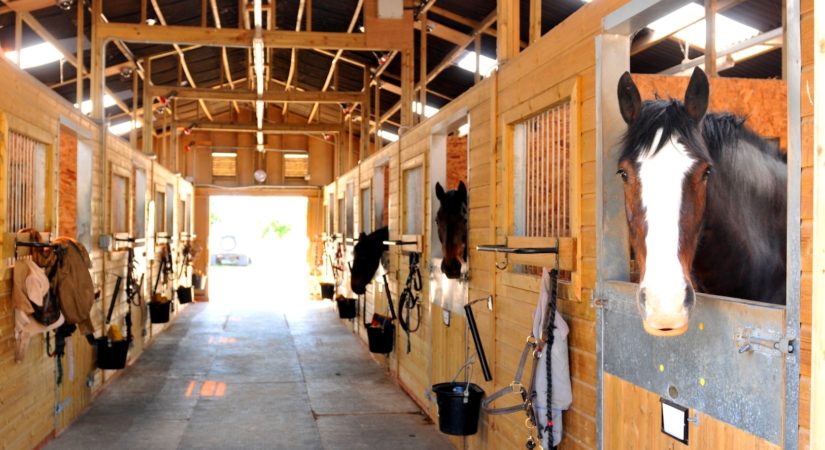Boarders come and boarders go, but sometimes they leave with unpaid bills. What happens when a barn owner has a boarder that leaves with a large unpaid balance? Unfortunately, most barn owners do not have security deposits to cover departing boarders’ unpaid accounts. Once the horse is out of the barn, it’s too late to do anything but start what will likely be a lengthy legal battle to get paid. In addition to a prolonged court case, the barn owner will incur legal fees to take the former boarder to court, and those costs are often unrecoverable. The boarding agreement should reference the state’s Horseman’s Lien statute as an available remedy for the to pay bills owed to the barn owner. In addition, the boarding agreement should include a note that the payment of legal fees expended will be required if needed to enforce the agreement.
The Horseman’s Lien
There is a legal mechanism that can be used to help avoid drawn-out legal proceedings to recover unpaid board and training bills – the Horseman’s Lien. Almost every state has a “Liens for Care of Horses” statute that provides protection for the “keeper of a livery stable or boarding and exchange stable” (“barn owner”) from having an owner remove a horse from the property with an unpaid bill. These laws allow barn owners to place liens on all animals in their care and to keep them until the unpaid bills are paid.
While the law is simple, using it to prevent a defaulting horse owner from taking the horse from the property is not. The scene typically plays out in the middle of the night when a van pulls up to the barn and the owner tries to load the horse and leave. The barn owner refuses to let the horse leave and a heated disagreement erupts. Soon, either the horse owner or the barn owner calls the police. A police officer, who likely has no knowledge of horses, let alone the Horseman’s Lien statute, ends up in the middle of an angry argument with people trying to take the horse off the property while others are trying to stop them. Without any idea about who’s right or who’s wrong or what should be done, the police officer has to make a decision to keep the peace—and the easiest way to do that is to let the legal owner of the horse take the horse off the property and to tell the barn owner to take it up with the court. While this is a perfectly logical way for the officer to handle the situation, the law dictates otherwise.
For example, New Jersey’s Liens for the Care of Horses provide that the barn owners have a lien on all animals left in their care for the amount due for board and care and, “shall have the right, without process of law, to retain the same until the amount of the indebtedness is discharged.” A companion statute allows for the sale of the horse after 30 days from the date of enacting the lien, provided various safeguards are followed to ensure that there is proper notice and an opportunity for the horse owner to make payment. Other states provide similar protections for barn owners from non-paying boarders.
In many cases, the barn owner doesn’t want another horse and simply wants to get paid what is owed without getting involved in legal proceedings or in a public auction and sale of the horse. However, in order to use the Horseman’s Lien effectively, the horse must remain on the property. To ensure this happens, the barn owner needs to take certain steps the minute it appears that a boarder is contemplating leaving without paying bills.
How to Use the Lien
First, the barn owner must provide notice of the outstanding bill to the boarder, preferably in a manner that documents its receipt. Next, the barn owner should contact the local police to provide them with proof of the unpaid bill and the intention to act upon the Horseman’s Lien. If the horse owner attempts to take the horse, this helps to ensure that law enforcement will be privy to the situation and that the barn owner has the legal right to prevent the horse from leaving.
Additionally, if the police do become involved, they’ll have two main concerns: keeping the peace and maintaining the welfare of the animal. With this in mind, it may also be a good idea for the barn owner to have a veterinarian monitor the horse and document that the horse is being kept safe and in good condition pending resolution of the bill. Having done all of this, the barn owner may be able to prevent the horse from being taken from the property, provided the police are willing to enforce the law as it’s written.
Resolving the Matter
More often than not, if the barn owner is able to keep the horse in the barn, the bill will eventually get paid because the bill is almost always less than the value of the horse. Once the horse is out of the barn, recovering the money owed is difficult, prolonged, and often a zero-sum game. If you are a barn owner, hopefully the Horseman’s Lien is something you will never have to use—but if you do, remember that communicating with the horse owner about your ability to place a lien and talking to local law enforcement about the situation will be the key to resolving the matter as smoothly as possible.
This story was originally published on Horse Network on December 7, 2020.

